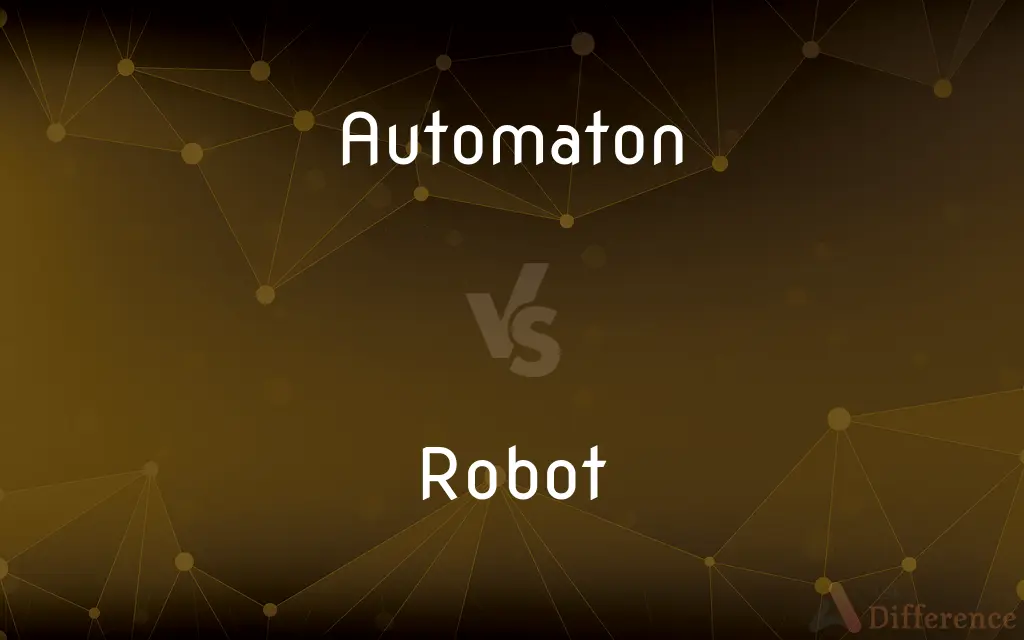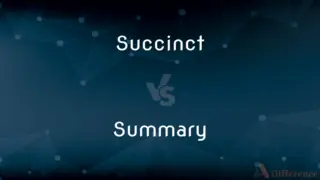Automaton vs. Robot — What's the Difference?
By Tayyaba Rehman — Updated on November 4, 2023
An automaton is a self-operating machine often imitating living beings, while a robot is a programmable device capable of executing tasks.

Difference Between Automaton and Robot
Table of Contents
ADVERTISEMENT
Key Differences
An automaton, historically, refers to a self-operating machine, often designed to mimic human or animal motions, created to perform a set sequence of movements. Robots, on the other hand, are advanced automatons that can be programmed to perform various complex tasks, often equipped with sensors and artificial intelligence.
Automatons are seen as the precursors to robots. While automatons are often mechanical and pre-programmed, robots are usually electronic and have capabilities for reprogramming and interactive behaviors. The term automaton conveys a sense of mechanical artistry and can sometimes be used metaphorically to describe mechanical behavior, whereas robot implies modernity, automation, and technological sophistication.
In the context of control, automatons operate on a set of fixed instructions and have limited functionality. Robots are designed to respond to their environment and make decisions based on programming and sensor input. Automatons are typically used for entertainment or educational purposes, like clockwork figures in a show, while robots are utilized in a variety of fields, from manufacturing to service industries.
The complexity of robots can vary from simple machines capable of repetitive tasks to complex AI systems capable of learning and adapting. Automatons are less about computation and more about the illusion of life or automation of simple tasks. Robots, especially modern ones, are about extending human capabilities, performing dangerous, delicate, or repetitive tasks, and improving efficiency.
Automatons, being the ancestors of robots, have a place in the history of technology as marvels of mechanical engineering. Robots are contemporary embodiments of advancements in computer science, engineering, and artificial intelligence. An automaton could be a wind-up toy, while a robot could be a Mars rover, exploring and sending data from another planet.
ADVERTISEMENT
Comparison Chart
Origin
Ancient to early modern innovations.
20th century onwards.
Functionality
Fixed, pre-set actions or sequences.
Programmable, versatile functions.
Control
Mechanical systems and clockwork.
Electronic systems with potential AI integration.
Usage
Entertainment, timekeeping, demonstrations.
Industrial, medical, military, consumer automation.
Adaptability
None, operates on a loop or fixed pattern.
High, can adapt and react to environments.
Compare with Definitions
Automaton
A self-operating machine, typically simulating human or animal figures.
The cuckoo clock was adorned with an automaton that chirped every hour.
Robot
A device that can interact with its environment and make autonomous decisions.
The latest robot can learn from its surroundings and improve its performance.
Automaton
A mechanical device that performs a pre-determined sequence of operations.
The automaton played the piano with precise, programmed movements.
Robot
An artificial agent in the form of a machine.
The robot was tasked with diffusing hazardous materials safely.
Automaton
A person who acts in a mechanical fashion.
He went about his daily tasks like an automaton, without enthusiasm.
Robot
A synthetic organism designed to imitate a human.
The humanoid robot was able to hold a conversation with real people.
Automaton
An automaton (; plural: automata or automatons) is a relatively self-operating machine, or control mechanism designed to automatically follow a predetermined sequence of operations, or respond to predetermined instructions. Some automata, such as bellstrikers in mechanical clocks, are designed to give the illusion to the casual observer that they are operating under their own power.
Robot
A robot is a machine—especially one programmable by a computer—capable of carrying out a complex series of actions automatically. A robot can be guided by an external control device, or the control may be embedded within.
Automaton
A machine or mechanism that operates without human intervention, especially a robot.
Robot
(especially in science fiction) a machine resembling a human being and able to replicate certain human movements and functions automatically
A sci-fi movie about time-travelling killer robots
The robot closed the door behind us
Automaton
One who behaves or responds in a mechanical way.
Robot
Another term for crawler
Automaton
A machine or robot designed to follow a precise sequence of instructions.
Robot
A set of automatic traffic lights
Waiting at a robot I caught the eye of a young woman
Automaton
A person who acts like a machine or robot, often defined as having a monotonous lifestyle and lacking in emotion.
Due to her strict adherence to her daily schedule, Jessica was becoming more and more convinced that she was an automaton.
Robot
A mechanical device that sometimes resembles a human and is capable of performing a variety of often complex human tasks on command or by being programmed in advance.
Automaton
A formal system, such as a finite-state machine or cellular automaton.
Robot
A machine or device that operates automatically or by remote control.
Automaton
A toy in the form of a mechanical figure.
Robot
A person who works mechanically without original thought, especially one who responds automatically to the commands of others.
Automaton
(dated) The self-acting power of the muscular and nervous systems, by which movement is effected without intelligent determination.
Robot
A form of urban dance involving a succession of separate movements executed with precision in imitation of a robot.
Automaton
Any thing or being regarded as having the power of spontaneous motion or action.
So great and admirable an automaton as the world.
These living automata, human bodies.
Robot
A system of serfdom used in Central Europe, under which a tenant's rent was paid in forced labour.
Automaton
A self-moving machine, or one which has its motive power within itself; - applied chiefly to machines which appear to imitate spontaneously the motions of living beings, such as men, birds, etc.
Robot
An intelligent mechanical being designed to look like a human or other creature, and usually made from metal.
Automaton
Someone who acts or responds in a mechanical or apathetic way;
Only an automaton wouldn't have noticed
Robot
A machine built to carry out some complex task or group of tasks by physically moving, especially one which can be programmed.
We have a robot in the house that does the vacuuming.
Automaton
A mechanism that can move automatically
Robot
(figuratively) A person who does not seem to have any emotions.
Automaton
An apparatus that moves automatically.
Museum visitors were fascinated by the 18th-century automaton.
Robot
(South Africa) A traffic light (from earlier robot policeman).
Automaton
A motorized figure or object used to demonstrate scientific principles.
The classroom featured an automaton that illustrated the laws of physics.
Robot
(surveying) A theodolite which follows the movements of a prism and can be used by a one-man crew.
Robot
(dance) A style of dance popular in disco in which the dancer imitates the stiff movements of a stereotypical android robot.
Robot
(Internet slang) A habitual poster on the /r9k/ board on 4chan; a member of the /r9k/ community.
Robot
A mechanism that can move automatically
Robot
A programmable mechanical device that performs tasks.
The robot on the assembly line increased production efficiency.
Robot
An autonomous machine capable of carrying out a series of actions.
They introduced a robot capable of navigating complex terrains.
Common Curiosities
What is an automaton?
An automaton is a self-operating machine designed to automatically follow a pre-set pattern.
Are all robots also automatons?
Yes, all robots are a type of advanced automaton.
Can automatons learn from their environment?
No, traditional automatons cannot learn; they follow pre-determined sequences.
Is AI necessary for a robot?
No, not all robots have or require AI to function.
Do robots have emotions?
No, robots do not have emotions, though some are programmed to simulate emotional responses.
Do robots always require electricity?
Most modern robots require electricity, but some may run on alternative power sources.
What's the simplest form of an automaton?
The simplest form is a mechanical device that performs a single, repetitive action.
What is a robot?
A robot is a programmable mechanical device that can perform a variety of tasks autonomously or semi-autonomously.
Can robots think independently?
Some robots, with artificial intelligence, can make decisions based on programming and sensor input.
What industries use robots?
Robots are used across many industries, including automotive, healthcare, defense, and consumer electronics.
Were automatons the first robots?
Historically, automatons can be seen as the predecessors to what we now call robots.
Can robots function without human input?
Some robots can operate autonomously after programming, while others require constant human input.
Do automatons have practical uses today?
Today, automatons are mainly used for educational and entertainment purposes.
How are automatons and robots powered?
Automatons are typically powered by mechanical means like winding, while robots are usually powered by electricity or batteries.
Are automatons still being made?
Yes, automatons are still made, often as novelties or intricate timepieces.
Share Your Discovery

Previous Comparison
Wit vs. Humour
Next Comparison
Succinct vs. SummaryAuthor Spotlight
Written by
Tayyaba RehmanTayyaba Rehman is a distinguished writer, currently serving as a primary contributor to askdifference.com. As a researcher in semantics and etymology, Tayyaba's passion for the complexity of languages and their distinctions has found a perfect home on the platform. Tayyaba delves into the intricacies of language, distinguishing between commonly confused words and phrases, thereby providing clarity for readers worldwide.















































